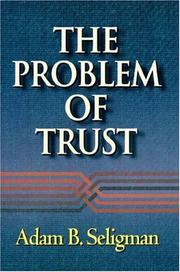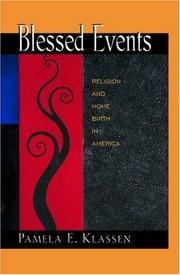| Listing 1 - 3 of 3 |
Sort by
|

ISBN: 0691050201 0691012423 1400822378 1400813360 9780691050201 9780691012421 Year: 2000 Publisher: Princeton (N.J.): Princeton university press,
Abstract | Keywords | Export | Availability | Bookmark
 Loading...
Loading...Choose an application
- Reference Manager
- EndNote
- RefWorks (Direct export to RefWorks)
The problem of trust in social relationships was central to the emergence of the modern form of civil society and much discussed by social and political philosophers of the early modern period. Over the past few years, in response to the profound changes associated with postmodernity, trust has returned to the attention of political scientists, sociologists, economists, and public policy analysts. In this sequel to his widely admired book, The Idea of Civil Society, Adam Seligman analyzes trust as a fundamental issue of our present social relationships. Setting his discussion in historical and intellectual context, Seligman asks whether trust--which many contemporary critics, from Robert Putnam through Francis Fukuyama, identify as essential in creating a cohesive society--can continue to serve this vital role.Seligman traverses a wide range of examples, from the minutiae of everyday manners to central problems of political and economic life, showing throughout how civility and trust are being displaced in contemporary life by new "external' system constraints inimical to the development of trust. Disturbingly, Seligman shows that trust is losing its unifying power precisely because the individual, long assumed to be the ultimate repository of rights and values, is being reduced to a sum of group identities and an abstract matrix of rules. The irony for Seligman is that, in becoming postmodern, we seem to be moving backward to a premodern condition in which group sanctions rather than trust are the basis of group life.
Political sociology --- Political systems --- Social psychology --- #SBIB:35H501 --- 316.47.052 --- Bestuur en samenleving: netwerken, inspraak, participatie, interactief beleid --- Vertrouwen in sociale relaties --- 316.47.052 Vertrouwen in sociale relaties --- Social role --- Role, Social --- Social interaction. --- Trust. --- Social role. --- Social interaction --- Trust --- Human interaction --- Interaction, Social --- Symbolic interaction --- Trust (Psychology) --- Social status --- Exchange theory (Sociology) --- Psychology --- Attitude (Psychology) --- Emotions --- Agape. --- Appadurai, Arjun, "ed. --- Arendt, Hannah. --- Axial chasm. --- Banfield, Edward. --- Benhabib, Seyla. --- Bernstein, Basil. --- Boden, Deirdre. --- Bynum, Caroline. --- Calvinism. --- Cambridge Platonists. --- Catholicism. --- Christianity. --- Constant, Benjamin. --- Diderot, Denis, "ed. --- Douglas, Mary. --- Durkheim, Emile. --- Elias, Norbert. --- Frankfurt, Harry. --- Ghana, Frafas people of. --- Grief, Avner. --- Harrison, Bernard, "ed. --- Herman, Gabriel. --- Kahneman, Daniel. --- Lasch, Christopher. --- Macfarlane, Alan. --- Maza, Sarah. --- Merton, Robert. --- Otto, Rudolf. --- Protestantism. --- Puritanism. --- asceticism. --- associational life. --- baptism, private. --- capitalism. --- citizenship. --- civility. --- communitarianism. --- confidence. --- contract law. --- credit, symbolic. --- divorce. --- expectation, trust as. --- externality. --- familiarity. --- friendship. --- game theory. --- honor. --- incivisme. --- marriage. --- networks, of trust. --- postmodernity. --- Rol social. --- Interacción social. --- Interaction sociale --- Role (Sociology) --- Confiance --- Rôle social

ISBN: 0691087989 1400828511 0691087970 Year: 2001 Publisher: Princeton Princeton university press
Abstract | Keywords | Export | Availability | Bookmark
 Loading...
Loading...Choose an application
- Reference Manager
- EndNote
- RefWorks (Direct export to RefWorks)
Blessed Events explores how women who give birth at home use religion to make sense of their births and in turn draw on their birthing experiences to bring meaning to their lives and families. Pamela Klassen introduces a surprisingly diverse group of women, in their own words, while also setting their birth stories within wider social, political, and economic contexts. In doing so, she emerges with a study that disrupts conventional views of both childbirth and religion by blurring assumed divisions between conservative and feminist women and by taking childbirth seriously as a religious act.Most American women who have a choice give birth in a hospital and request pain medication. Yet enough women choose and advocate unmedicated home birth--and do so for carefully articulated reasons, social resistance among them--to constitute a movement. Klassen investigates why women whose religious affiliations range from Old Order Amish to Reform Judaism to goddess-centered spirituality defy majority opinion, the medical establishment, and sometimes the law to have their babies at home. In considering their interpretations--including their critiques of the dominant medical model of childbirth and their views on labor pain--she examines the kinds of agency afforded to or denied women as they derive religious meanings from childbirth. Throughout, she identifies tensions and affinities between feminist and traditionalist appraisals of the symbolic meaning of birth and the power of women.What does home birth--a woman-centered movement working to return birth to women's control--mean in practice for women's gender and religious identities? Is this supreme valuing of procreation and motherhood constraining, or does it open up new realms of cultural and social power for women? By asking these questions while remaining cognizant of religion's significance, Blessed Events challenges both feminist and traditionalist accounts of childbearing while broadening our understanding of how religion is ''lived'' in contemporary America.
Childbirth at home --- Religious aspects --- Religious aspects. --- United States --- Albanese, Catherine. --- Auletta, Valerie. --- Bachelard, Gaston. --- Barry, Kathleen. --- Bell, Catherine. --- Birth Gazette. --- Braidotti, Rosi. --- Bynum, Caroline Walker. --- Christ, Carol. --- Copeland, Kenneth. --- Cyborg Manifesto (Haraway). --- Day, Dorothy. --- Dickinson, Emily. --- Donato, Suzanne. --- Edwards, Elizabeth. --- Flaherty, Sara. --- Foucault, Michel. --- Gallagher, Janet. --- Griffith, Marie. --- Hechtel, Eva. --- Home Birth (Kitzinger). --- Hostetler, Tina. --- Immaculate Deception (Arms). --- Islam. --- Jay, Nancy. --- Jewish maternity hospitals. --- Jones, Linda Carson. --- Katz, Joanna. --- Kaufert, Patricia. --- Kleinman, Arthur. --- Lazarus, Ellen. --- MacCormack, Carol. --- Mather, Cotton. --- Moran, Marilyn. --- Norris, Kathleen. --- Olds, Sharon. --- Orsi, Robert. --- Park, Caroline. --- Pollinger, Annette. --- Porterfield, Amanda. --- Scarry, Elaine. --- Smith, Bonnie. --- Taylor, Simone. --- Thatcher, Elaine. --- abortion. --- alternative birth movement. --- fetus. --- habitus. --- hooks, bell. --- procreation stories. --- racism. --- sacred. --- Religion and culture
Book
ISBN: 1400844347 Year: 2003 Publisher: Princeton (N.J.) : Princeton Univ. Press,
Abstract | Keywords | Export | Availability | Bookmark
 Loading...
Loading...Choose an application
- Reference Manager
- EndNote
- RefWorks (Direct export to RefWorks)
The early Christian and medieval practice of spiritual marriage, in which husband and wife mutually and voluntarily relinquish sexual activity for reasons of piety, plays an important role in the development of the institution of marriage and in the understanding of female religiosity. Drawing on hagiography, chronicles, theology, canon law, and pastoral sources, Dyan Elliott traces the history of spiritual marriage in the West from apostolic times to the beginning of the sixteenth century.
Europe --- Europe --- Social life and customs. --- Church history --- Abelard. --- Adalbert (deacon of Bamberg). --- Aelred of Rievaulx. --- Alan of Lille. --- Alphonse of Pecha. --- Amon of Nitria. --- Apostolic Canons. --- Arnold of Villanova. --- Barlow, Frank. --- Bede the Venerable. --- Beguines. --- Bernard of Clairvaux. --- Bolton, Brenda. --- Burrus, Virginia. --- Bynum, Caroline Walker. --- Caesarius of Heisterbach. --- Catherine of Bologna. --- Charlemagne (emperor). --- Chiarito del Voglia. --- Chrysostom, John. --- Clement of Alexandria. --- Collectio Seguntina. --- Conrad of Piacenza. --- Daniélou, Jean. --- Desert Fathers. --- Domitilla (martyr). --- Ebernand von Erfurt. --- Eddius Stephanus. --- Elizabeth of Hungary. --- Euchites. --- Fliche, Augustin. --- Flodoard of Rheims. --- Fortunatus, Venantius. --- Gangulf (martyr). --- Geneviève of Brabant. --- Gentile of Ravenna. --- Gilbert of Sempringham. --- Gnosticism. --- Hali Medenhad. --- Handlyng Synne. --- Historia Compostellana. --- Ida of Bologne. --- Isidore of Seville. --- Jacobilli, Luigi. --- James Oldo. --- John the Baptist. --- Kieckhefer, Richar. --- Landulf the Senior. --- Lawrence (martyr). --- Lyndwood, William. --- anticlericalism. --- courtly love.
| Listing 1 - 3 of 3 |
Sort by
|

 Search
Search Feedback
Feedback About UniCat
About UniCat  Help
Help News
News